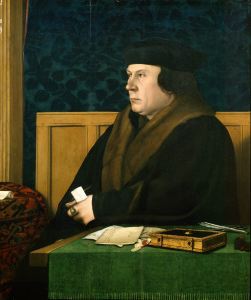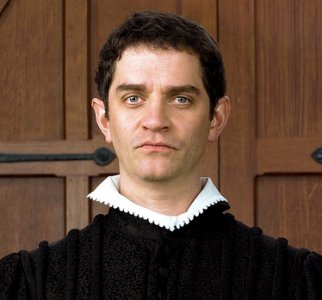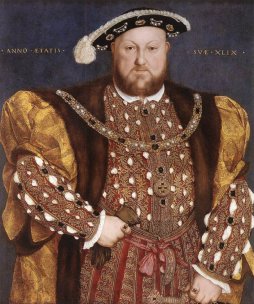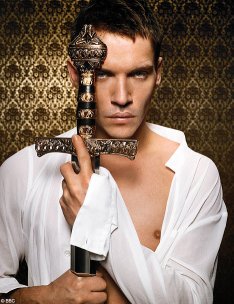A Useful Man
Wolf Hall, Hilary Mantel, 2009
This novel, winner of the Man Booker Prize, is set in the era of Henry VIII from 1527 to 1535 and is told from the perspective of Thomas Cromwell. For the English, the story and cast of characters is probably familiar from childhood, but for this reader it was helpful to have recently viewed the first two seasons of The Tudors TV Series. Unfortunately in the series Henry (Jonathan Rhys Meyers) is not fat and Cromwell (James Frain) is not ugly and physically imposing. The novel has the huge advantage that we can share not only Cromwell’s words (“the most cunning man in England, but who looks like a killer”) but his innermost thoughts as well.


Cromwell in 1527 <> <> <> <> Frain as Cromwell
The novel actually opens in 1500 with Thomas’ blacksmith father Walter delivering a severe beating almost killing 15 year old Thomas. Thomas runs away to the continent where he fights alongside the French briefly before continuing on to Italy (Venice and Florence) where he receives a first class education (bookkeeping, trade, banking and finance, and the law). He returns to England an experienced trader, lawyer, and commited Machiavellian. Cromwell finds work with Cardinal Wolsey, Archbishop of York the most powerful, richest, and vainest man in England. Wolsey surrounds himself with cleaver aids and Cromwell is the ablest and cleaver ist.
We pick up the story in 1527 when Cromwell is 42 and Henry has decided that Katherine of Aragon will not be able to give him a male heir and wants to divorce her to marry Anne Boleyn. Wolsey is unable to help with Henry’s divorce and Henry slowly confiscates Wolsey’s property as punishment. Cromwell carries messages between Henry and Wolsey and Henry comes to respect Cromwell for his loyalty and straight talking intelligence. When Wolsey falls from power, Henry brings Cromwell to advice him and Cromwell slowly gains power and influence in England.


Henry VIII Painting <> <> <> <> Meyers as Henry
Much of Cromwell’s advice has to do with empowering Parliament and making Henry head of the Church in England. The Church holds a third of all land in England and Cromwell realizes that selectively confiscating this land and imprisoning treasonous churchmen will assure Henry’s power and finances. Cromwell becomes the most feared man in England.
The novel is subtly written and assumes the reader is generally familiar with the story and cast of characters. Because it is told from Cromwell’s point of view it is a very Machiavellian view of the times and events. One example: a lord in the north is mismanaging his estates and is heavily in debt. It is Cromwell’s job to talk some sense into him.
Cromwell: But my lord, they need supply, they need provision they need walls and forts in good repair. If you cannot ensure these things you are worse than useless. The king will take your title away and give them to someone who will do the job you cannot…
Lord Percy: He will not. He respects all ancient titles all ancient rights.
Cromwell: Then Let’s say I will. (to himself) Let’s say I will rip your life apart. Me and my banker friends. How can I explain to him? The world is not run from where he thinks. Not from his border fortresses, not even from Whitehall. The world is run from Antwerp, from Florence, from places he has never imagined; from Lisbon, from where the ships with sails of silk drift west and are burned up in the sun. Not from the castle walls, but from counting houses, not be the call of the bugle, but by the click of the abacus, not by the grate and click of the mechanism of the gun but by the scrape of the pen on the page of the promissory note that pays for the gun and the gunsmith and the powder and shot.
Other times Mantel brings an incredible conciseness to a complex tale:
But Christendom was overturned for the Boleyn marriage, to put the ginger pig (Elizabeth) in the cradle.
Not exactly Shakespeare, but that just about sums up the whole story. Well worth the effort.